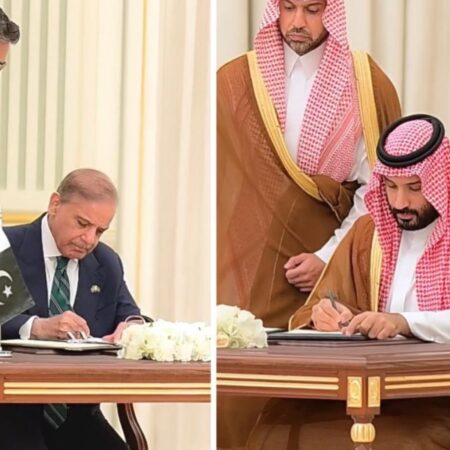On Friday, the constitutional bench of the Supreme Court conditionally permitted military courts to issue reserved verdicts for 85 civilians who were still being held in connection with the May 9 disturbances of the previous year.
The bench clarified that its final decision on the appeals against the Oct. 23, 2023 ruling will apply to the military courts’ verdicts.
The head of the constitutional bench, Justice Aminuddin Khan, announced the decision, saying, “Suspects who can be given concessions in their sentences should be given so and released.”
He gave the order, “Once their sentence has been pronounced, suspects who cannot be released should be moved to jails.”
This occurred as a seven-judge panel began deliberating on a case in which over 100 citizens are being tried for their suspected involvement in attacks on army posts during the riots that followed the arrest of former Premier Imran Khan on May 9, 2023.
Justices Jamal Khan Mandokhail, Naeem Akhtar Afghan, Muhammad Ali Mazhar, Hassan Azhar Rizvi, Musarrat Hilali, and Shahid Bilal Hassan were on the bench, which was presided over by Justice Aminuddin.
A five-member Supreme Court bench, consisting of Justices Ijazul Ahsan, Munib Akhtar, Yahya Afridi, Syed Mazahar Ali Akbar Naqvi, and Ayesha Malik, unanimously ruled last year in a widely acclaimed decision that the accused civilians’ trials in military courts were unconstitutional.
The Supreme Court had ruled that criminal courts with sufficient authority constituted under the ordinary or special law of the nation would try the accused instead of military courts.
However, the Supreme Court conditionally stayed its own Oct. 23 order, albeit by a different bench, on December 13 of last year in a 5-1 majority verdict while it heard a series of intra-court appeals (ICAs).
A six-member Supreme Court bench had previously permitted military courts to issue reserved rulings in the cases earlier in March. Additionally, it changed the Dec. 13 injunction, stating that military tribunals could start proceedings but would not convict or acquit any suspects until the government-instituted ICAs were finished.
In contrast to the ruling today, the bench on Monday denied the government’s request to permit military courts to render decisions in finished trials, stating that doing so would suggest that the court accepted the military courts’ authority to judge civilians, according to Justice Hilali.
During the same hearing, the bench asked whether anti-terrorism courts (ATCs) had issued spoken instructions outlining their justifications prior to transferring cases to military courts on May 9.
The hearing’s high point yesterday was when Justice Mandokhail questioned how the Pakistan Army Act (PAA) 1952 could be applied to a non-army member, raising concerns about the validity of civilian military proceedings under Article 8.
Justice Aminuddin stated today that all other cases had been deferred and that the constitutional bench was only considering the matter pertaining to military trials.
In announcing the decision, Justice Aminuddin stated that until the issue in the highest court was resolved, the ability to appeal military court rulings in higher courts would be stopped.
The bench head noted that “the appeal period in the high courts will begin after the final decision [by the SC].”
History of the case
As it considered petitions submitted by Imran, former CJP Khawaja, Aitzaz Ahsan, and Karamat Ali, a five-member bench ruled that the military trials of 103 civilians were invalid.
The ICAs were considered by a six-member court before the 26th Amendment’s creation of the constitutional bench and subsequently by seven justices after the former requested a larger bench.
After it was revealed that Justice Ayesha, one of the members of the constitutional bench, had recused herself from hearing the appeals because she was one of the five justices who rendered the Oct. 23, 2023 ruling, Justice Hassan was named the eighth member of the constitutional court last week.
The provincial governments of Punjab, Khyber Pakhtunkhwa, and Balochistan, along with the then-caretaker federal government, had appealed the decision. Sindh has declined to submit a fictitious plea on the same issue and was left out of the earlier petitions.
Additionally, the defense ministry filed an ICA asking the Supreme Court to halt the implementation of the ruling while the appeal was pending.
Syed Kauser Ali Shah, the KP Additional Advocate General, had sent in a letter in March stating that the provincial government intended to drop the appeal against the Oct. 23 decision.
The next month, a list of 20 people was also presented to the SC, indicating that the military tribunals were permitted to retry cases in accordance with the SC’s directives on March 28 and, as a result, imposed sentences in cases with less severe penalties.
According to the report, 20 people received one-year sentences, of whom 17 served 10.5 months and three served 9.5 months.
Even though none of the individuals had completed their entire one-year sentence, the army chief, in accordance with Section 143(1)(i) of the Pakistan Army Act, 1952 (PAA), sent the remaining portion of their penalty.
According to the order, the convictions would be governed by the court’s rulings on the appeals.
Justice Mazhar had noted during the July hearing that the government should make sure that the court’s previous orders about providing meals and holding weekly family meetings were followed.












No Comment! Be the first one.